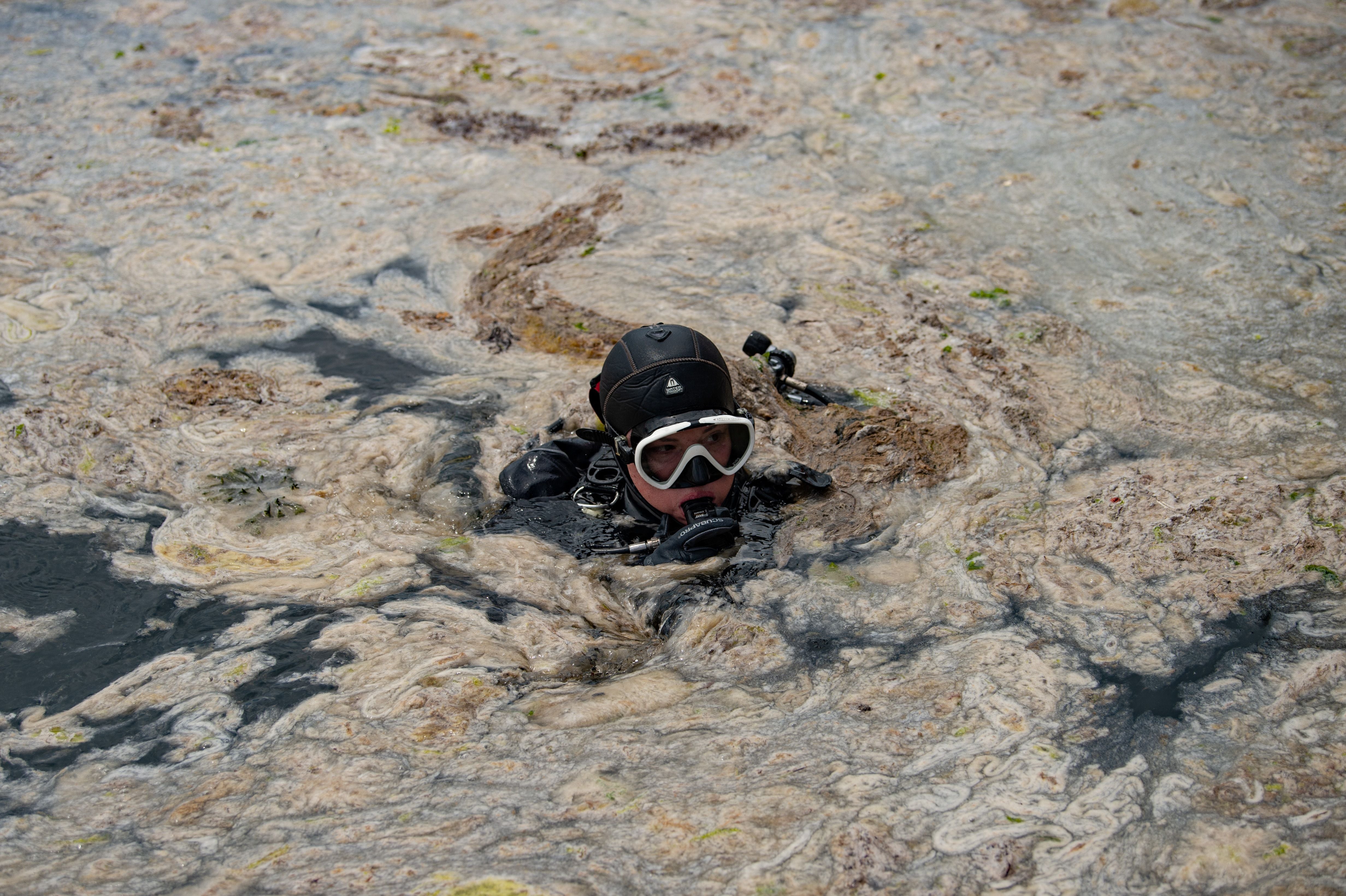Speak softly and carry poo: How Turkey is putting climate on the agenda
Using tangible signs of degradation to cherished natural landmarks may be the best way to jumpstart a conversation about climate change in countries where awareness is lagging, writes Borzou Daragahi


There was talk of detox tea and the dangers of mRNA vaccines, as well as strong dashes of New Age mumbo-jumbo about holistic living. But the point of the boat tour along the Bosphorus Strait and into the Sea of Marmara was to raise awareness about climate change and protect the environment.
“We hope to change a lot of stuff, the way people think about climate change,” said Kahraman Haliscelik, of the Our World Foundation, an organisation devoted to protecting Turkey’s environment. “Our main philosophy is clean water, clean soil, and clean air. These are all interdependent.”
Much of the Western world is at the very least aware of the dangers of climate change, the topic of the major ongoing Cop27 in Sharm el-Sheikh, Egypt. Concerns about rising sea levels and catastrophic weather patterns, as well as awareness of practices that could mitigate the damage of our consumption-oriented lifestyles, have begun to seep into the collective consciousness. That is important because it’s the West that continues to be the primary producer of carbon emissions as well as other forms of ecological degradation.
But developing and middle-income countries are also major contributors to the climate crisis, while lagging on issues such as recycling and transportation alternatives. Perhaps the Our World Foundation is onto something.
The organisation has little if any interaction with more combative and longstanding environmentally oriented groups in Turkey, including a nascent Green Party which authorities under the sway of president Recep Tayyip Erdogan and his allies refuse to officially allow to register. The local chapter of Greenpeace has a combative relationship with authorities.
In contrast, Our World is founded and promoted by former and current government officials, establishment figures and well-known celebrities. One of them is Ender Sarac, a popular physician and television star who offers up advice about healthy living.
“The environment, no matter what our politics, is all of our concern,” said Haliscelik, who is also a former foreign ministry official.
Turkey’s environmental troubles come to the fore annually with increasingly ferocious forest fires. According to a 2021 UN report, Turkey is on course to face rising temperatures, declining rainfall and snowfall, and sea levels encroaching on its 5,000 miles of coastline. The report predicts water and food scarcity, dying rivers and lakes, and increased desertification.
Turkey has made some baby steps. Supermarket chains charge extra for single-use plastic bags. There have been modest reforestation efforts. The use of coal in residential heating has been banned. But the country has a long way to go.
To connect with Turks, Our World Foundation is focusing on uniquely local issues that resonate among all classes and social backgrounds. One is “sea slime”, the nasty toxic foam that has begun to develop along the Sea of Marmara that makes swimming dangerous and strangles sea life vital to fishermen. Our World explains that sea slime is caused by increases in ocean temperatures that allow algae-like microorganisms to form.
Turkey’s beloved seas and seaways are being poisoned. Internationally, for example, there are 13 micrograms of petroleum per litre of ocean water. In the sea of Marmara, it’s more than 10 times that standard, at 148 micrograms. In the Caspian Sea, it is 230 micrograms. In the strait of Dardanelles and the Black Sea, it’s double that. And in the famed Bosphorous that courses through Istanbul, it’s an astounding 1,100 micrograms. The petroleum gets into the sea life and is absorbed by the freshly-caught fish that Turks love to eat.
But during the boat trip, perhaps the most shocking revelation was that the freighters that pass through Turkey to get in and out of the Black Sea regularly dump their wastewater, including accumulated faecal matter, into the sea where people boat, swim and fish.
The description of the practice prompted gasps among those on the boat tour. “We hopefully will convince the government to have this practice stopped,” said Haliscelik.
Stopping boats from dumping their poo into the sea is not going to save the planet. But using tangible signs of degradation to cherished natural landmarks may be the best way to jumpstart a conversation about climate change in countries where awareness about the environment is lagging.
To keep up to speed with all the latest opinions and comment, sign up to our free weekly Voices Dispatches newsletter by clicking here
In nations like Turkey that often prioritise elite business interests over the public good, building up such pressure can be effective. Only days after the Our World Foundation trip, which was covered by some national media, Turkey’s government issued new regulations on wastewater from boats waiting to cross the straits connecting the Black Sea to the world’s oceans.
In an interview, Haliscelik said governments such as those in Ankara often do not take well to the type of confrontational approach espoused by most environmental activists, though he acknowledged that such agitation has its place.
“We are trying to get the government to act, but it doesn’t mean we have to be part of any opposition against the government,” he said. “There is an alternative way. We can be clear and direct and still do the work. You can’t do it in Turkey by fighting. You have to draw others in.”
Getting the world to act to mitigate or even reverse anthropogenic climate change requires a number of strategies on different fronts in order to connect with and inspire different constituencies. Sometimes it means unleashing the righteous anger of Greta Thurnberg on lazy and complacent senior officials. Sometimes it means teaming up with celebrity doctors. And sometimes it means speaking softly and wielding the image of a big pool of untreated poo.






Join our commenting forum
Join thought-provoking conversations, follow other Independent readers and see their replies
Comments